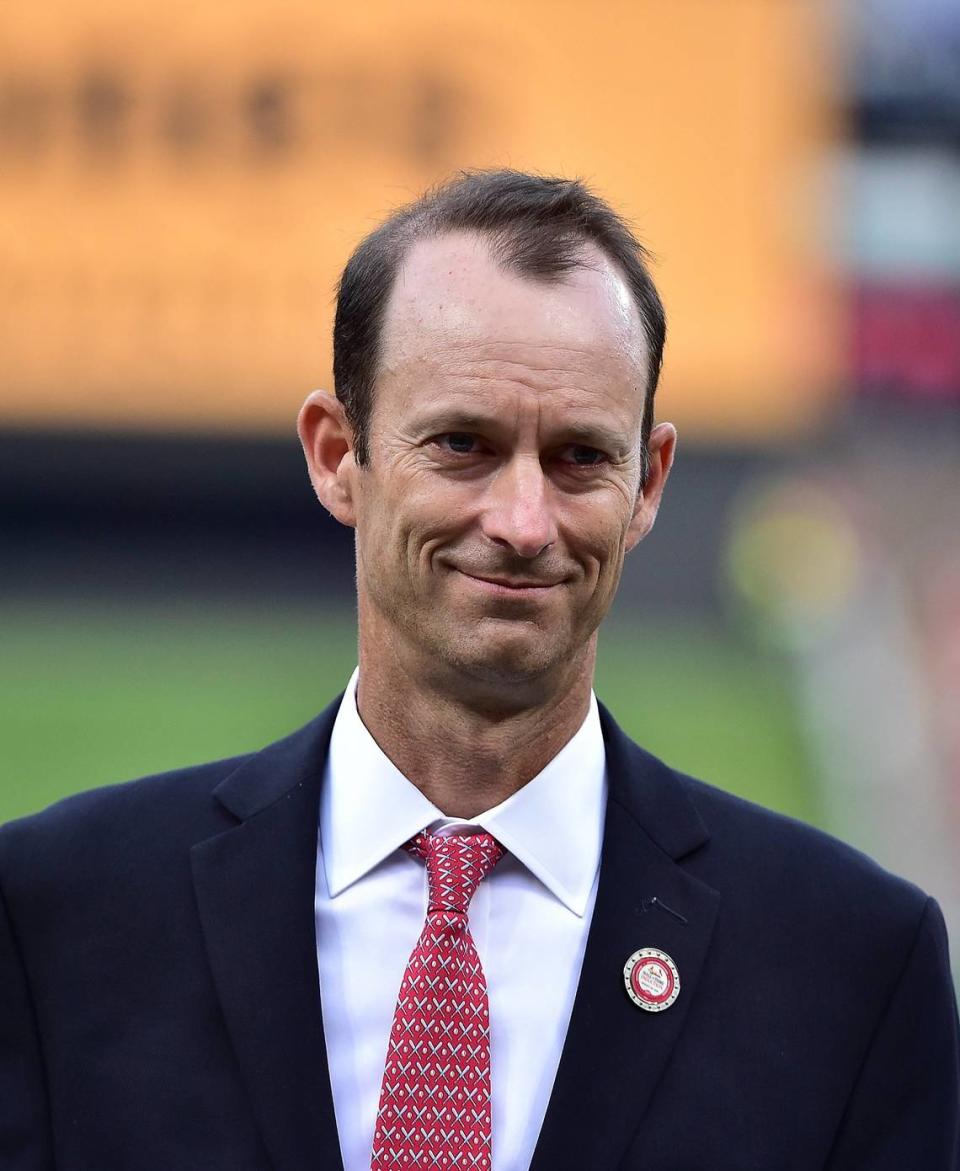Cardinals’ ownership took another misstep with blasé , but tone-deaf, comments
An important disclosure off the top: I don’t know St. Louis Cardinals President Bill DeWitt III in any meaningful way, but in the countless times I have met and interviewed him, I have come away with the impression of an executive who has a reasonable understanding of the dynamics of the market and who takes seriously the responsibility of being a caretaker for one of the game’s truly essential and historic franchises.
I have always, in my mind, characterized him as above and apart from baseball’s spate of second generation mediocrities – your Mark Lerners, your John Angeloses, your Hal Steinbrenners – who have inherited their blindingly golden geese only to grumble publicly about the idea of covering their costs.
Starting from that baseline, then, you can measure the distance of my surprise surrounding his recent comments regarding the recent reactions of disgruntled Cardinals fans. Perhaps I’ve been a sucker all along.
In a recent interview with Martin Kilcoyne which was hosted by the Scoops Sports Network (second disclosure: I have previously been a paid contributor to that website), DeWitt laughed aloud as he mused, “the thing I sometimes chuckle about is when I see sometimes comments [like], ‘we’ve got to not show up to send a message that this isn’t acceptable to the owners.’
“I find that one somewhat illogical reasoning,” he continued, “because we just turn this revenue machine into a payroll machine. I mean that’s what this is, this business. We try to drive as much revenue as we can, and then it gets put on the field, for the most part.”
There are sufficient misunderstandings and mischaracterizations packed into those three sentences to be analyzed in nearly every page of a newspaper, but fundamentally, it reveals an attitude which situates the relationship between sports owner and sports fan precisely backward.
Teams don’t invest in players because fans permit them to do so; teams spend money on players to encourage fans to spend money after the fact.
Payroll drives the gate, it’s not driven by it. That’s the way it’s supposed to work. Otherwise, if you’ve bought tickets to see the Cardinals in the last three decades, you should have your hand out for a dividend check.
DeWitt did not respond to a request for an interview made through a Cardinals media relations staffer.
Most of the interview with Kilcoyne centered on recent blasé comments made by DeWitt which blossomed into an overwrought story in the Riverfront Times regarding the team’s pursuit of public money for upkeep and upgrades to Busch Stadium. Neither that story nor the podcast touched on the obvious variable which will drive that pursuit – sports gambling.
DeWitt did tell Kilcoyne that the team would expect to have a plan to be made public roughly a year from now; the team was among a consortium of professional franchises throughout the state who contributed to the effort behind gathering petition signatures to put a referendum which would legalize gambling on the ballot this November, even squeezing in a lobbying appearance for Fredbird in between his appearances at events for children.
A year from now, it’s likely that sports gambling will be legal in Missouri and that the Cardinals will be well on their way toward constructing a brick and mortar sports book at either Ballpark Village or the stadium itself, and that revenue will be pitched as the well they intend to tap for stadium renovations.
The public funding used to build the nearly-20-year-old stadium was not onerous as those things go, and given the round defeat suffered at the ballot box this spring by the Kansas City Chiefs and Royals, the Cardinals will seemingly have the good sense to draft a deal which brings fans maximum enjoyment for minimal direct pocketbook pain. What’s concerning, though, is the inherent assumption of unwavering support, and how the team might act when that’s tested.
Despite historically low attendance figures at the stadium in the early going, the Cardinals remain among the top draws in baseball. They’ve drawn an average of 36,849 fans to home games, despite meager results and uneven weather. That’s good for sixth in the majors. They also rank outside of the top 10 in payroll, so it’s possible that attendance doesn’t translate quite so directly as the team might have fans believe.
Payroll, ultimately, isn’t the issue either.
The team is tracking to finish at an all-time high for a second consecutive season, and while they don’t spend like the Dodgers, they aren’t the Royals, either.
The issue remains how the money is spent, how oversight is doled out in baseball operations, why player development is leaps and bounds behind the competition, why mediocrity would be an improvement, and why the current ownership group has allowed itself to have oversight over what could be the franchise’s most fallow competitive period in six decades.
The most generous reading of DeWitt’s mirthless laughter in the direction of the fan base is that ownership doesn’t need to be made aware of the issues because they’re already as agitated as they can be. The least generous would be something akin to the horror show put on by Cincinnati Reds COO (and son of the owner) Phil Castellini in 2022, where he challenged fans over payroll concerns by asking, “where are you gonna go?”
The Reds, in the last two years, have gone nowhere but straight toward the bottom of the division, cushioned only by the collapsed Cardinals. Castellini, meanwhile, made the apology rounds and has largely kept himself muffled. He’ll almost certainly become the control person of the Reds when his father, Bob, passes the team on or passes away, and as soon as he does, you can bet rumors will start about the potential for their sale.
The Castellinis were formerly part of the ownership group in St. Louis, and inarguably, Cardinals fans made out much better with the Cincinnatian whose stake was held onto. DeWitt has made reference in recent weeks to a plan of succession behind his 82-year-old father, and has said the family intends to own the team into the indefinite future.
He would do well, then, to be careful to avoid waltzing into too many more unnecessary potholes.
Whatever the dip in support may have been for the Cardinals over the last two years, the floor has held firm. Outside of the pandemic-altered 2020 and 2021 seasons, Busch Stadium has never announced an attendance of less than 30,000. Despite still not being able to buy a scrap of Sonny Gray or Masyn Winn merchandise at the ballpark, fans are turning out in droves, spending harder-to-earn-than-ever-before dollars on all things Redbird related.
A team that can’t seem to win is still turning over plenty of dollars.
That’s for now.
One last disclosure: that support is neither mandatory nor permanent. Fans may be in the throes of discovering just how much the Cardinals feel they owe when the rubber hits the road. At the end of the fall, no one will be left laughing.

 Yahoo Sports
Yahoo Sports 

